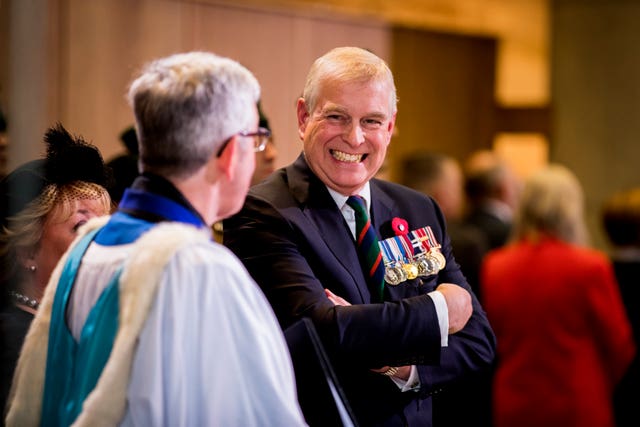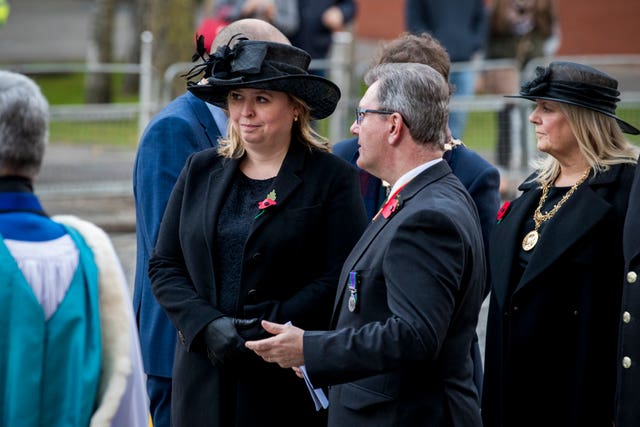
The sacrifice of soldiers from Protestant and Catholic backgrounds who died in the First World War has “bequeathed a shared responsibility to heal the past”, the Catholic Archbishop of Ireland has said.
Eamon Martin was addressing a service at St Anne’s Cathedral in Belfast to mark the centenary of Armistice Day.
His remarks came at a time when the Northern Ireland Assembly has been collapsed for almost two years, with multiple attempts to revive the powersharing government ending in failure.
The Duke of York, Northern Ireland Secretary Karen Bradley and Democratic Unionist MP Jeffrey Donaldson were among those attending the service held at the same time as similar events in Dublin, Cardiff and Glasgow.

Sinn Fein vice president Michelle O’Neill attended a service in Dublin.
The party’s Belfast Lord Mayor Deirdre Hargey did not attend the act of remembrance at Belfast City Hall or the service at St Anne’s. Deputy Lord Mayor Emmet McDonough-Brown of the Alliance Party deputised for her.
The service in Belfast saw a moment of reflection rather than an act of remembrance and instead of wreaths, several volumes of Ireland’s Memorial Records were laid at a field altar.
The books were borne by four people each of whom have at least one family member who was killed in the war and was named in the Memorial Records.
The service was led by the Dean of Belfast, the Very Reverend Stephen Forde, with participation by Archbishop Martin and Church of Ireland Archbishop Richard Clarke.
Celebrated Belfast poet Michael Longley read his work Ceasefire.

Addressing the service, Mr Martin described feeling “deeply moved” earlier this year when he laid a wreath during the Last Post ceremony at the Menin Gate in Ypres with Mr Clarke.
He also described a previous visit to Ypres in 2016 when he found the final resting place of his great uncle Edward, who died in the First World War.
“My visits in recent years to the Somme and to Flanders, with Archbishop Richard Clarke and the other church leaders, have really opened my eyes to the grief and suffering that was shared by families of all traditions and from every part of Ireland,” he said.
“Three granite blocks at the Peace Park in Messines remind visitors of those from across the island of Ireland who were killed, wounded or missing during the war: 32,000 from the 36th Ulster Division, 28,000 from the 16th Irish Division, 9,000 from the 10th Irish Division.
“Sadly, because of the cruel twists and tensions of our history of conflict, the fact that Irish Catholics and Protestants fought and died, side by side, was neglected for too long – and perhaps conveniently – by all sides, both north and south of the border.
“People preferred to cling on to a history of difference and separation, rather than recognise and embrace our shared story of common suffering.”
Mr Martin urged that their sacrifice be a lesson.
“The brave people we are remembering are calling us to recognise their shared suffering by building a better future where difference is accepted and respected,” he said.
“Although standing at war memorials, wearing poppies, laying wreaths and the Last Post may not have been part of my tradition or upbringing, to remember the dead, to honour and pray for them – especially during the month of November – is important to the practice of my faith.
“In recent years I have grown to understand more fully that, whilst we may remember in different ways, and whilst our forebears had differing and often conflicting approaches to the war, what unites us now in their memory is so much greater than anything that is talked up to divide us.
“Can we learn from their shared sacrifice, a full century after the so-called ‘war to end all wars’?
“They have bequeathed us a shared responsibility for healing the past and building lasting trust and peace.
“Peace is not merely ‘ceasefire’ or the absence of violence and war. Peace is an ongoing work of reconciliation, justice and hope. It means coming out of our own trenches, building bridges, not parapets.”
The service was organised by the Northern Ireland First World War Committee, of which Mr Donaldson is the chairman.
He praised the progress made across Ireland in terms of how historical events are marked.
“There have been special moments that not long ago would have been unthinkable,” he said.
“Royal princes and dukes paying respect to Ireland’s dead. Irish Defence Forces pipers playing at Belfast City Cenotaph, the colours of the Royal Irish Regiment paraded in Dublin alongside their comrades in Oglaigh na hEireann, with echoes of the 16th and 36th divisions fighting side by side in common cause at Messines.
“Far from being purely symbolic, a deeper understanding, tolerance and respect has flowed from these events. Relationships built that have already proven their worth and will last.
“No one’s unionism or nationalism is diminished as a result.”


Comments: Our rules
We want our comments to be a lively and valuable part of our community - a place where readers can debate and engage with the most important local issues. The ability to comment on our stories is a privilege, not a right, however, and that privilege may be withdrawn if it is abused or misused.
Please report any comments that break our rules.
Read the rules here